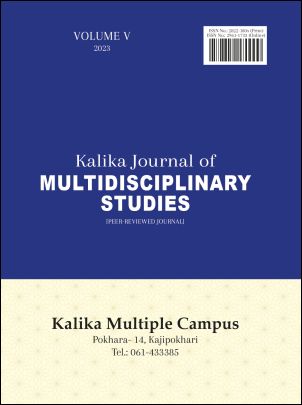Impact of 2015 Earthquake on the Shifts in Internal and International Relations of Nepal
DOI:
https://doi.org/10.3126/kjms.v5i1.60918Keywords:
Assistance, disaster response, domestic politics, earthquake, NepalAbstract
The devastation generated by the 2015 Nepal Gorkha earthquake greatly affected the country’s politics and security, impacting the lives of around 8 million individuals with 9000 recorded deaths, more than 22 thousand injured. Thousands of private houses, public building, cultural heritages and critical infrastructures were damaged. More than 30 districts of Nepal felt the surmounting consequences of the terrible aftershocks. The aim of the paper is to evaluate the shifts within the domestic discourse in Nepal’s political happenings and also to look at the role of global actors in the humanitarian efforts in the country, filling the gaps left by state actors in the kerfuffle. The Constitution and the call for assistance by the central government were important in guaranteeing a certain kind of post-disaster stability and restoring as well as uplifting public morale and belief in the state systems. Adopting a qualitative method, through an analytical lens the study looked at the overall impact of the quake on Nepal’s politics and the trends of bilateral, regional and global assistance, focusing on the major donor agencies and the role of Nepal’s neighbouring states. There were several new developments and outlooks with regards to both state interests and the framework of disaster response. The paper also recognizes the importance of regional integration either by means of institutional instruments or through some other measure alongside a cohesive internal policy arrangement amongst the parties for future strategies aiming at effective disaster reduction and response.
Downloads
Downloads
Published
How to Cite
Issue
Section
License
All rights reserved. No part of this journal may be produced in any form or by any electronic or mechanical means, including infromation storage and retrieval system, without permission in writting from the publisher, except by a reviewer who may quote brief passage in review.




